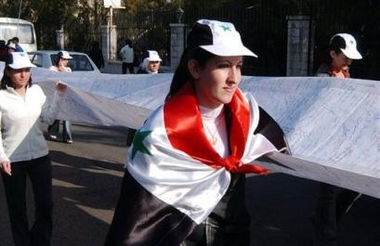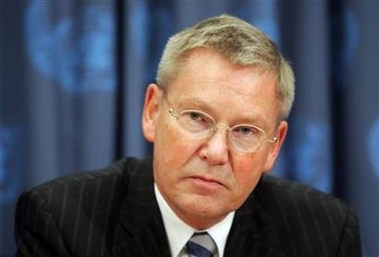|
UN investigator on Hariri stepping down
(AP)
Updated: 2005-12-07 08:46
The chief U.N. investigator into the assassination of former Prime Minister
Rafik Hariri will quit after he submits a report on the inquiry next week, an
aide said Tuesday, worrying some Lebanese over the future of the probe.
Some in Syria, which has been under pressure to cooperate with the United
Nations inquiry, appeared to welcome the move by Detlev Mehlis to step down
after Dec. 15. Mehlis has implicated Syrian and Lebanese security officials in
the assassination.
But many Lebanese, including Hariri's family, believed the move by the German
prosecutor could set back efforts to find those responsible for the Feb. 14
bombing in Beirut that killed Hariri and 20 others.
"Although Mr. Mehlis, when he originally came on board, made it clear it was
for six to seven months only, if at any time his services are required he would
certainly make himself available beyond the middle of December," said Mehlis'
spokeswoman, who by the investigation's rules speaks on condition of anonymity.

Syrian University students carrying a 1km long
piece of cloth signed by Syrian university students to be put infront of
the UN headquarters in Damascus on Tuesday, Dec. 6, 2005. The
demonstration was held to protest at an interim U.N. commission report,
released in October, implicating top Syrian and Lebanese security
officials in the death of former Lebanese premier Rafik Hariri.
[AP] | Mehlis was quoted in The New York Times as
saying he will definitely leave.
"That will be the end from my personal mandate. I have to go back and I will
go back to my job that I like. I never asked for this assignment. I agreed to be
available up to seven months," added Mehlis, who normally does not give
interviews.
Lebanese Prime Minister Fuad Saniora, who is seeking a six-month extension of
the U.N. inquiry, said after meeting with Mehlis on Tuesday that the U.N.
Security Council will choose a successor to head the probe. He said Mehlis had
"personal reasons" for leaving, including the fact that he's in Lebanon and his
wife is in Germany.
Syria and its Lebanese allies have tried to discredit the investigation,
often lashing out at Mehlis for implicating Damascus and seeking to quiz top
Syrian officials. U.N. investigators began questioning five Syrian officials
about the killing in Austria on Monday. The interviews are expected to last
through Wednesday.
Mehlis has spent most of his time holed up in his heavily guarded suburban
Beirut hotel, only venturing out in convoys of his own security and Lebanese
police. In October, Mehlis requested stepped up security for his team after he
said the commission received threats that were deemed credible.
Syrian Foreign Minister Farouk al-Sharaa, visiting Cairo on Tuesday, repeated
Damascus' claim that Mehlis had politicized the probe.

German prosecuter Detlev Mehlis speaks to the
media after addressing the United Nations Security Council at UN
Headquarters in New York on October 25,
2005.[Reuters/file] | "We are for the inquiry
taking its natural course," he said. "But when the goal of the investigation
becomes political, that means it is getting further away from uncovering the
truth."
In Lebanon, some said Mehlis' departure would hamper the investigation.
"The international investigation will not stop after Mehlis steps down,"
wrote As-Safir daily managing editor Sateh Noureddine. "(But) it will give the
impression that reaching the truth in the Hariri assassination may take years,
if not decades."
Saad Hariri, the son of the slain premier, said he hoped Mehlis would stay
on, but added the inquiry would not be affected by his leaving.
There have been suggestions that Mehlis wanted to step down to protest a
purported deal between the U.N. and Syria to spare President Bashar Assad's
government in return for the Syrian leadership changing regional policies. Other
possible reasons were alleged American pressure on the investigation to
implicate Syria and reports that Mehlis felt he may have been duped by
fraudulent witnesses who misled the investigation.
Saniora said Mehlis' decision to quit had nothing to do with Syrian witness
Husam Taher Husam, who recanted his testimony to the commission last week and
accused Hariri's family and Lebanese officials of bribing him to frame Syria.
Mehlis rejected the claims and accused Syria of trying to obstruct his probe.
The Hariri slaying and subsequent investigation have rocked regional
politics, placing Syria under intense international pressure to end its long
interference in Lebanese affairs. Syria, which was the powerbroker in Lebanon
for three decades before the April withdrawal of its forces, denies any role in
the assassination.
|